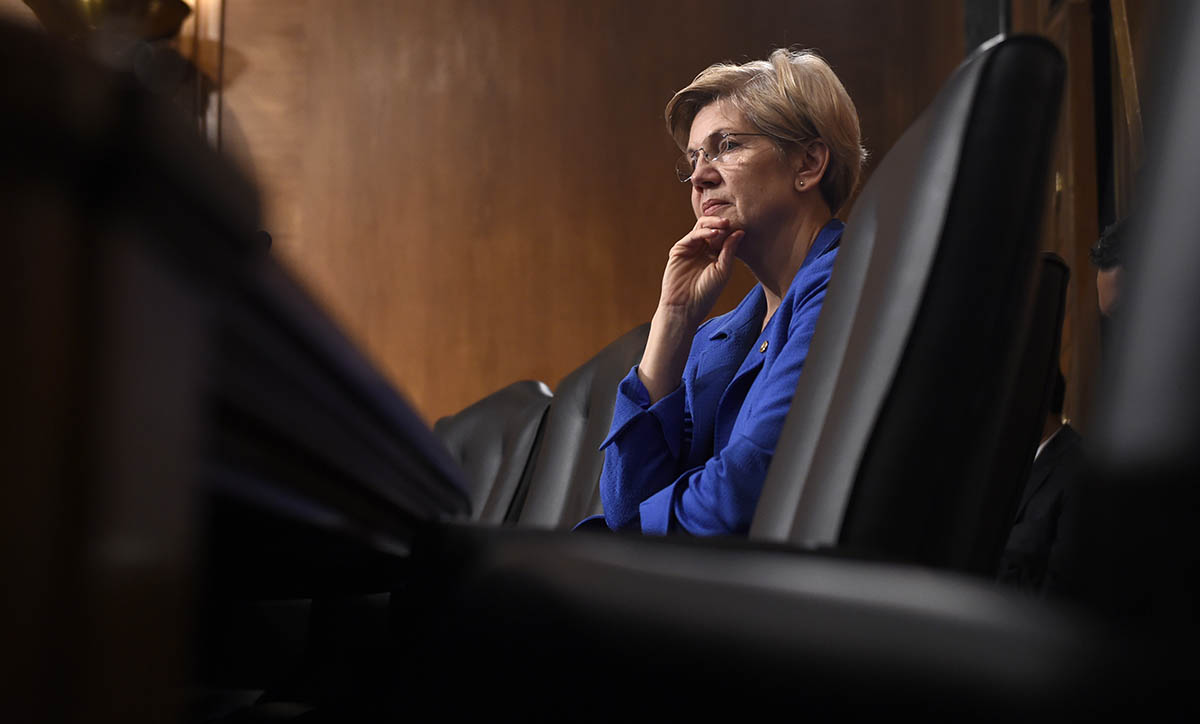Sen. Elizabeth Warren: Hold Corporate Lawbreakers Criminally Accountable

Photo via AP
Sen. Elizabeth Warren won’t run this year, and who knows if she’ll endorse before November rolls around. But late last week, Warren published a scathing report blasting the failure of federal law agencies to bring criminal charges against corporate lawbreakers under President Barack Obama’s leadership.
This sounds an awful lot like what Vermont Sen. Bernie Sanders has been calling for on the campaign trail.
The report, the first in an annual series on enforcement, lays out 20 criminal and civil cases in 2015, in which the federal government “failed to require meaningful accountability from either large corporations or their executives involved in wrongdoing.”
“The failure to adequately punish big corporations or their executives when they break the law undermines the foundations of this great country,” Warren wrote in a New York Times op-ed promoting the report. “Justice cannot mean a prison sentence for a teenager who steals a car, but nothing more than a sideways glance at a CEO who quietly engineers the theft of billions of dollars.”
Warren highlights how five of the world’s biggest banks—including JPMorgan Chase, which has made $696,456 in political contributions to Hillary Clinton during her time in the Senate, and Citigroup, which made $824,402 in contributions—admitted to rigging billions of dollars of foreign currency, yet not one individual has faced criminal charges from the Department of Justice; how General Motors, whose $14 billion bailout both Clinton and Sanders voted in favor of in 2008, engaged in a years-long cover-up of ignition switch problems in its vehicles, resulting in at least 124 deaths and 275 injuries, yet not one individual has faced criminal charges from the Department of Justice, how Novartis, already effectively on federal probation for misconduct, gave kickbacks to pharmacies who pushed their products, and faced punishment so laughably lenient that even its CEO admitted that any reason to believe the company would be changing its behavior “remains to be seen.”
“Legislative agendas matter, but voters should also ask which presidential candidates they trust with the extraordinary power to choose who will fight on the front lines to enforce the laws,” Warren wrote. “The next president can rebuild faith in our institutions by honoring the simple notion that nobody is above the law, but it will happen only if voters demand it.”
This week, Goldman Sachs CEO Lloyd Blankfein, whose colleagues at the unscrupulous investment bank have given hundreds of thousands of dollars to Clinton, her campaign, and her eponymous foundation, blasted Sanders for his vituperative criticism of Wall Street. In an exclusive interview with the International Business Times, Warren defended Sanders.
“When Blankfein says that criticizing those who break the rules is dangerous to the economy, then he’s just repeating another variation of ‘too big to fail,’ ‘too big to jail,’ ‘too big even to prosecute,’” she told IBT. “That tells you here we are, seven years after the crisis and these guys still don’t get it. Seven years. That crisis cost an estimated $14 trillion, it cost jobs, it cost homes, it cost retirement funds. And Lloyd Blankfein stands up and says ‘Don’t even criticize me, I ran a company that was right at the heart of some of the biggest financial frauds in history and made money off it, but don’t you dare criticize me.’ That’s his position? That’s why we need voters to get really engaged.”
Engaged? Engaged with whom? Is any wonder that, a day after Warren’s remarks, The Hill reports that female senators are urging her to back Clinton?
Sanders has been calling for precisely the same thing outlined in Warren’s report for quite some time now. At his October rally at the Boston Convention and Exhibition Center, which drew crowds of nearly 20,000, Sanders mentioned just one fellow Democrat by name, and glowingly: “As your senator Elizabeth Warren reminds us, this is a rigged economy: heads they win, tails you lose.”
“One of the biggest mistakes our government made after the financial crisis was not prosecuting the people responsible for the greed, recklessness and illegal behavior that crashed our economy and ruined the lives of millions of Americans,” he told the Huffington Post in September, and repeated on a the campaign trail since in various iterations. “It is not acceptable that many young people have criminal records for smoking marijuana, while the CEOs of banks whose illegal behavior helped destroy our economy do not.”
Sound familiar?


